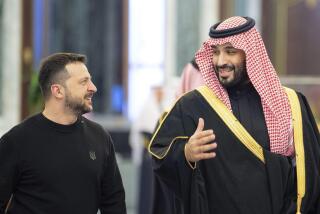Saudis Pressure Iraq to Approve Oil Output Cuts : King Fahd Reportedly Moves to Help Salvage Stalemated OPEC Talks
- Share via
GENEVA — OPEC oil ministers looked to their political leadership in the Persian Gulf region Tuesday to salvage a stalemated effort to drive up world oil prices to $18 per barrel.
Negotiations at the ministers’ conference of the Organization of Petroleum Exporting Countries were at a virtual standstill as top-level government pressure was apparently brought to bear on military rivals Iraq and Iran to come to an agreement between themselves on cutting oil production.
The power broker was believed to be King Fahd of Saudi Arabia, the nation which has been Iraq’s chief financial backer in its six-year war with Iran. The Saudis also have effective control over a big share of Iraq’s oil exports.
The OPEC campaign to trim production and boost prices has been bogged down since Saturday over Iran’s insistence that Iraq, which now is exempt from OPEC’s temporary system of ceilings on oil output, be subject to the same quotas as everyone else. Iraq has generally resisted, leaving the 13-member-nation cartel at an impasse after six days of on-and-off negotiations.
Meeting Canceled
Since talks abruptly adjourned Saturday, the OPEC ministers have held just one brief meeting. A Tuesday session was canceled, and no time was set for an anticipated session today.
Ministers and other delegates contended that the major work of the cartel’s sixth meeting of the year, a complex agreement to cut oil production by 5% to 10% and set fixed prices averaging $18 per barrel, has been agreed upon in broad terms. OPEC President Rilwanu Lukman of Nigeria, in the cartel’s only formal statement since talks began, said Tuesday that the agreement requires only some “fine-tuning.”
And in his only public remarks since arriving at his first OPEC meeting, new Saudi Oil Minister Hisam Nazer said on his way into a cocktail party hosted by the non-OPEC Middle East nation of Bahrain that his country has agreed to cut oil production. That, a major compromise by the Saudis, had been widely reported but unconfirmed.
Asked how the talks were going, Nazer said: “Saudi Arabia is going to reduce its production. Isn’t that positive?”
Details of Fahd’s role were unclear, but speculation swept through the OPEC meeting here Tuesday that he had spoken by phone with Iraqi President Saddam Hussein and was meeting with Iraq’s foreign minister, Tarik Aziz. The official Saudi news agency later said that Aziz had delivered a message to Fahd somewhere in eastern Saudi Arabia, where the king was traveling on business.
Fires Oil Official
Also Tuesday, Fahd fired Abdul Hadi Taher, longtime governor of Petromin, the Saudi national oil company. He was said to be in Geneva at the moment, supposedly on business unconnected to the OPEC talks. It wasn’t clear how the firing might be related to the oil talks.
There is no uncertainty about the relationship of the Saudis to Iraq, however.
The Saudis have sent more than $25 billion to Iraq in support of its war against Iran. Moreover, a key oil pipeline carrying 350,000 barrels a day out of Iraq--a level scheduled to climb to 500,000 a day in January--passes through Saudi Arabia, and the oil is loaded into tankers at the Saudi port of Yanbu.
Support Is Critical
This support has been critical to Iraq’s success in attacking Iran’s oil facilities and seriously undermining the Iranians’ ability to export oil--and thus its entire economy.
“You don’t see how the Iraqis can hold out” against Fahd’s entreaties to support the OPEC accord, said OPEC analyst Fergus MacLeod of the British brokerage firm Barclays.
Iraqi Oil Minister Kassim Ahmed Taki said Tuesday that if his nation agreed to a quota at all, it couldn’t be “a single barrel less” than Iran’s current quota of 2.3 million barrels a day. But that would enable Iraq to produce virtually all-out, while military damage has prevented Iran from even approaching its theoretical quota.
OPEC bargainers said they hope for some answer that would let both nations claim victory at the bargaining table while giving the impression to the world that OPEC is united in cutting production.
More to Read
Sign up for Essential California
The most important California stories and recommendations in your inbox every morning.
You may occasionally receive promotional content from the Los Angeles Times.













